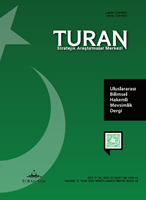İSLAM HUKUKUNDA KADINLARIN ŞAHİTLİĞİ: TARİHSEL VE MODERN YAKLAŞIMLAR
WOMEN'S TESTIMONY IN ISLAMIC LAW: HISTORICAL AND MODERN APPROACHES
Author(s): Feyzullah FeyyazSubject(s): Gender Studies, History of Islam, Contemporary Islamic Thought, Sociology of Religion, Sharia Law, Qur’anic studies
Published by: Sage Yayınları
Keywords: Shahāda; Testimony; Women's Testimony; Islamic Law; Qur'anic Foundations; Gender Equality;
Summary/Abstract: The issue of women's testimony in Islamic law continues to be a significant subject of debate, as it has been throughout history, due to differences in juridical interpretations (ijtihād). This study aims to elucidate the nature of the rulings concerning women's testimony in Islamic jurisprudence and to address prevalent misconceptions surrounding this topic. In this regard, it examines the legal foundations of women's testimony as established in the Qur’an and analyzes contemporary interpretations of its application. Misunderstandings regarding women's testimony often stem from an inadequate comprehension of the nature of Islamic law and its historical context. However, the Qur’an and Sunnah, which constitute the primary sources of Islamic legal discourse, explicitly address the issue of testimony, including that of women, by delineating shar‘ī (legal) principles governing this matter. Despite this, a common misconception persists that Islamic law universally assigns lesser weight to women's testimony compared to men's. In reality, Qur’anic injunctions and authentic hadiths adopt a nuanced and context-specific approach rather than a rigid, generalized principle. For instance, the requirement for two women to testify in certain financial transactions is frequently misinterpreted as a reflection of women's general reliability. However, this ruling must be understood within its specific socio-economic context and not as an inherent statement on the credibility of women. Contemporary Islamic jurists and legal scholars emphasize that the position of women's testimony in Islamic law has been shaped by historical and cultural factors rather than by any intrinsic legal inequality. Many scholars argue for a reassessment of classical fiqh interpretations to better align with modern legal perspectives while maintaining fidelity to Islamic legal principles. In summary, this study provides a jurisprudential and conceptual analysis of the rulings on women's testimony in Islamic law, offering a framework for a more precise understanding of its complexities. Furthermore, it underscores the necessity of contextualizing shahāda (testimony) within its proper legal and historical framework to dispel misconceptions and foster a more accurate representation of Islamic legal doctrine.
Journal: TURAN-SAM
- Issue Year: 17/2025
- Issue No: 65
- Page Range: 292-302
- Page Count: 11
- Language: Turkish

